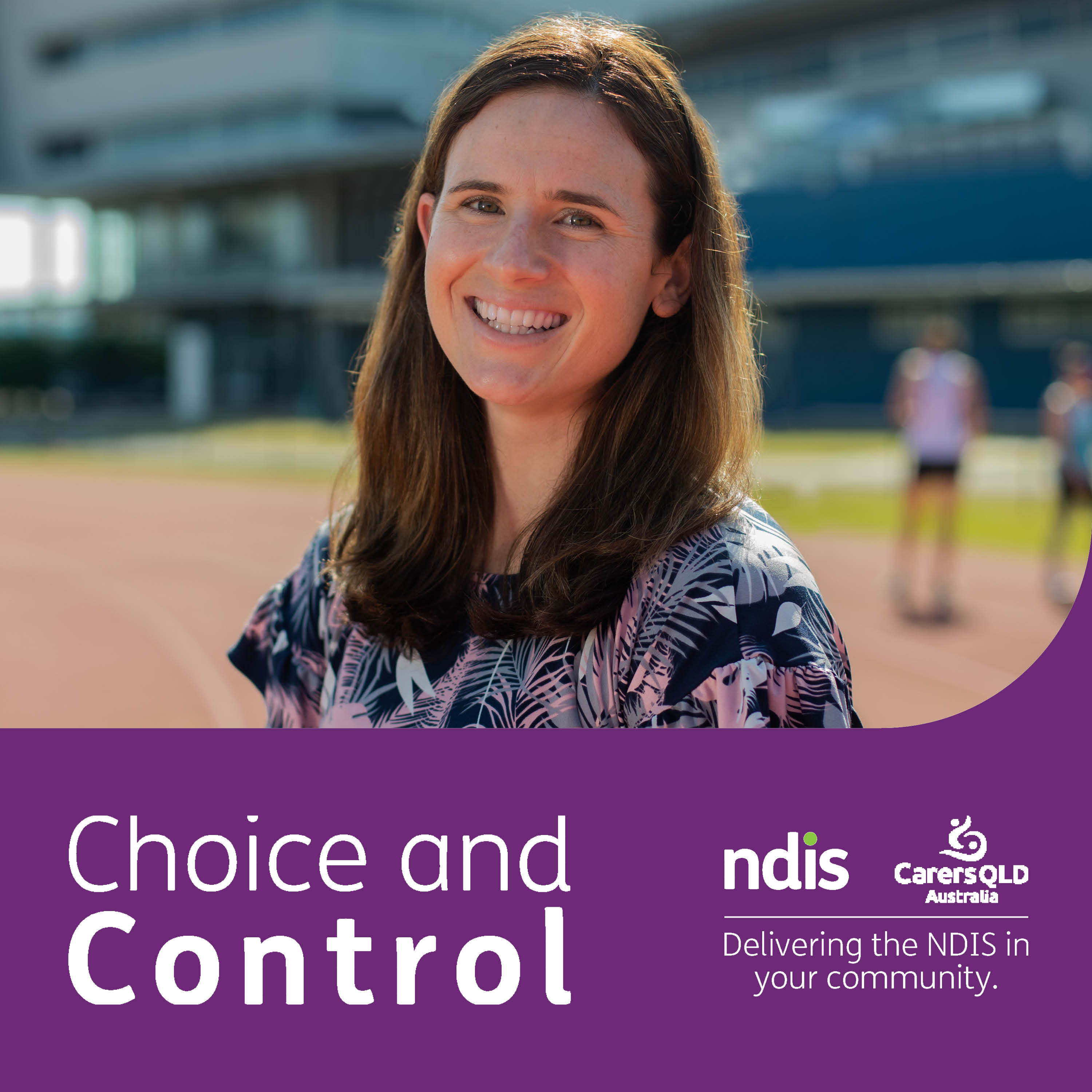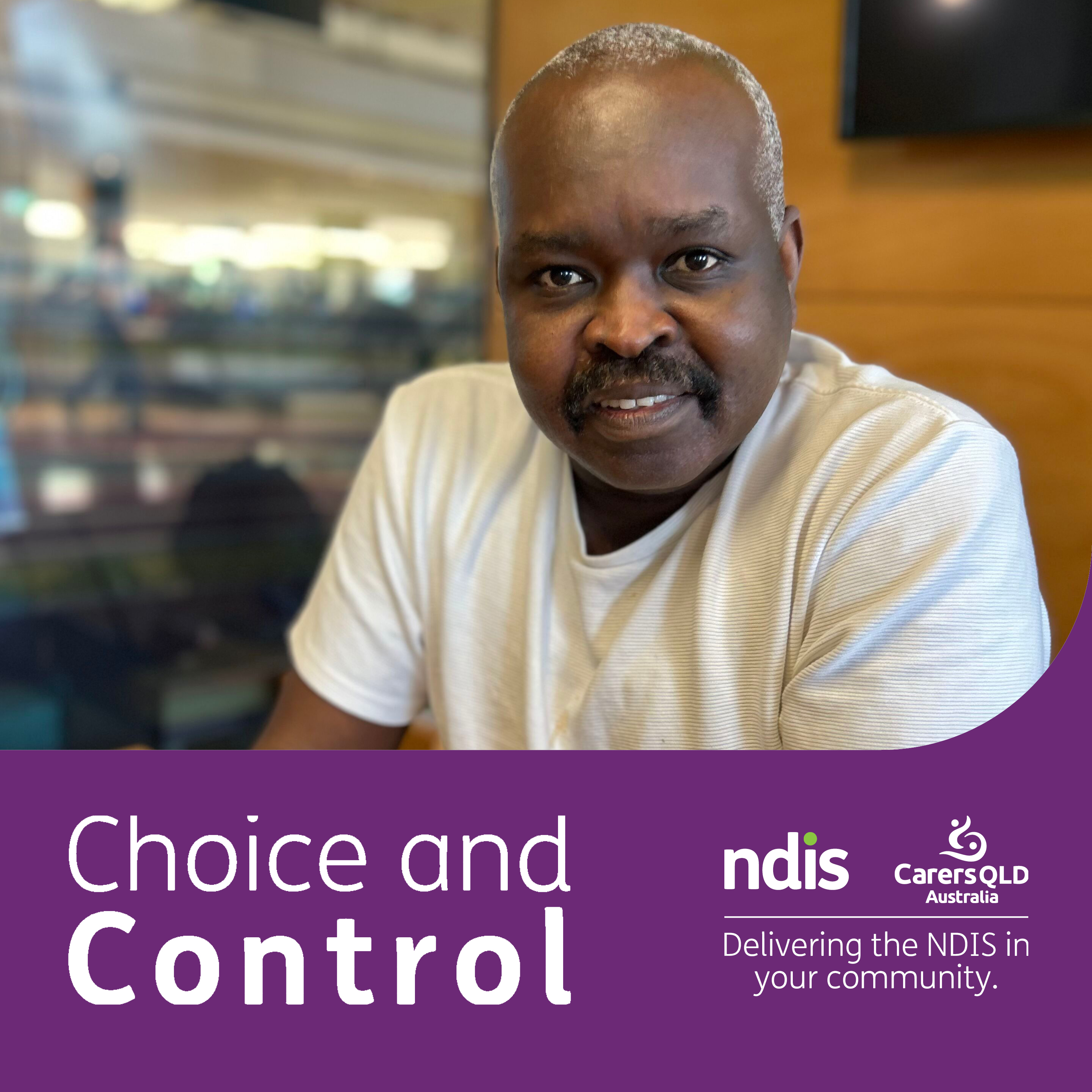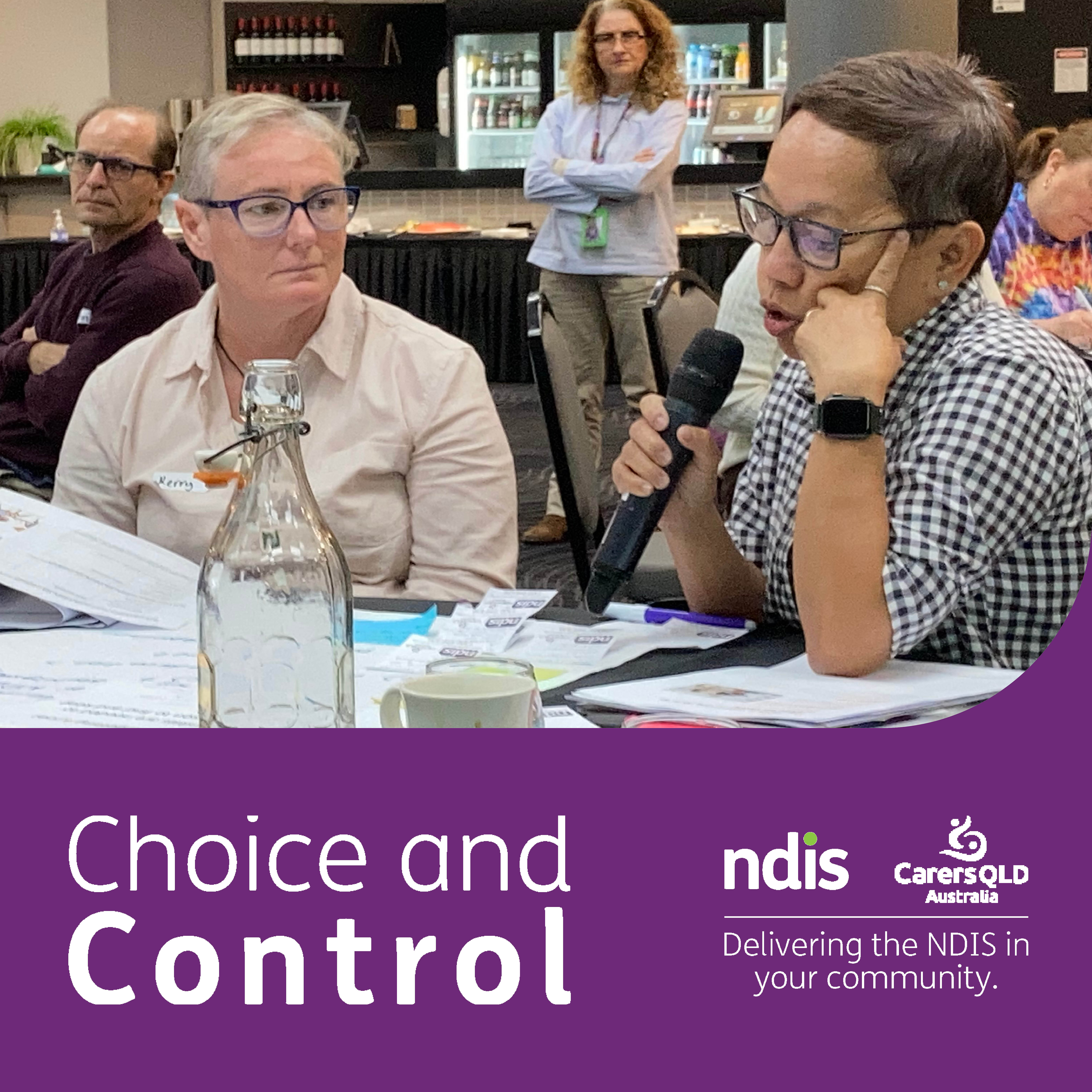Speaker 0 00:00:00 AAC connect. It's a new way to stay in touch with your local area coordinator, carers Queensland, with everything you need right here on your device. It's a handy app to keep track of your C appointments, browse workshops, and events, check out information and support and get the latest news stories and podcasts it's available on Android and iOS. So whatever device you have, you can stay in touch. Head to our website to sign
[email protected] AU. And look for connect
Speaker 0 00:00:38 Joyce and control a podcast, celebrating people with disability brought to you by carers Queensland, N D I S local area coordination partner in the community. Alberto Campbell stains is a Brisbane based Paralympian in the T 20 category for athletes with intellectual disability. He holds the under twentys Australian records for the 200, 400 and 800 meter sprints for T 20 athletes. He's also a teaching assistant and studying to further his career in education and his living independently with support from the N D I S but his story starts on the other side of the world. In Jamaica.
Speaker 2 00:01:17 I live at the orphanage for, um, a few years with other kids. I, I went to a school that was called school for the blind for people with, um, vision ness. But, um, I, I was, most of us kids weren't blind, but we still went. And, um, I met Paul and Julian in 2000. Um, mom was my grade one teacher and dad was, I was a music teacher slash um, PE teacher.
Speaker 3 00:01:58 And how long after meeting them, did you move to Australia
Speaker 2 00:02:03 Three years after? Um, God spoke to all three of us individually, which was pretty awesome. And, um, being that young, I wasn't sure if it was God or, you know, it was someone else, but anyways, I lived with mom and dad in Jamaica before, um, we came to Australia for a while. And then towards the end of 2003, we flew to Australia. I was either nine or 10. Then
Speaker 3 00:02:35 Were you into athletics before? Like when you were in Jamaica or wasn't until you came to Australia?
Speaker 2 00:02:41 I was into athletics when I was over there in Jamaica, but I truly got into it when I came to Australia, it all started back in the days. I think it was either 2004 or five. I had my first athletics carnival, and I remember mom and dad saying on the day, just go out there and have fun run with your friends. I surprised myself and everyone else when, um, I started to go up the ladder coming from like fifth or sixth to fourth, fourth, third, and I end up wanting, I end up winning that race.
Speaker 3 00:03:20 And that was your first race you won?
Speaker 2 00:03:22 Yeah. First race I've won. That was cross country back then. Oh, wow. And then, um, athletics. I was sussing it out, like, uh, I won all my races in athletics carnival, so yeah.
Speaker 3 00:03:37 And now obviously, you know, you're an athlete now you've gone to the Paralympic games. What did you have to do to get there?
Speaker 2 00:03:47 I had to work my butt off to get there. Honestly hard work does pays off. It was a great experience. I guess when I was little, my God was to, I guess, continue with athletics, see where it takes me. I had my first world champs back in 2013 with the Australian team. And, um, I did very well there. I was not expecting to get a bronze medal at all. And since then, I'm like, okay, let's see if we can, you know, set my goal a bit higher and say, my next goal would be to go to the Paralympics and, uh, was not expecting to go for my birth country at all.
Speaker 3 00:04:35 Yeah. And how did that eventuate, um, running for Jamaica at the recent Paralympic games?
Speaker 2 00:04:42 Honestly, it was a great experience. Um, I always wanted to go to Japan so I can tick that off my bucket list. I can tick off, um, going to the Paralympics, but representing my birth country was a bonus for my first Paralympic. I was, I was acting, um, honestly, I, I wish I, you know, did better, but, um, afterwards spoke, um, spoke to mum and dad afterwards and they explained that shouldn't really expect to do that well at, at first band Olympics. Uh, yeah, I was happy after mum and dad explained to
Speaker 3 00:05:21 Me. And could they come to the games with you or did they have to watch it from home?
Speaker 2 00:05:26 Uh, watch it from home, which was a bummer. Cause that's like the first time mom and dad haven't travel overseas to come and watch me run.
Speaker 3 00:05:38 And you were looking what's your athletic career in the future? What do you wanna do? Go back to the Paralympics, Commonwealth games, things like that. What, what are you striving for?
Speaker 2 00:05:47 I'm hoping I will make it to the 20, 24 Paralympics, but, um, honestly anything can happen from now until then.
Speaker 3 00:06:00 Mm.
Speaker 2 00:06:01 So, yeah.
Speaker 3 00:06:02 And so that's a little bit about athletics. I wanted to hear a little bit more about your life outside of athletics. Um, do you still work as, um, a primary teacher's assistant?
Speaker 2 00:06:13 Yes, I do. Coming up after 10 years, I supervise kids that, um, have a bit of trouble doing the activity. I'm not in the classroom anymore. Mm-hmm <affirmative>, um, I'm up in the sport department, which is very up my alley.
Speaker 3 00:06:30 Yeah. I was gonna say it's sounds like a good fit for you. <laugh> and what do you like about that role?
Speaker 2 00:06:36 It keeps me busy and, um, the kids always wanna have a race against me, so
Speaker 3 00:06:44 <laugh> ah, that's excellent. Do you let them win?
Speaker 2 00:06:49 Um, sometimes I do.
Speaker 3 00:06:52 And do you help some kids that are up and coming, um, athletic stars? Do you help them with their running?
Speaker 2 00:06:59 Uh, yeah, I, uh, I do a bit of coaching as well, so yeah, I'm coaching some kids in athletics in that area as well.
Speaker 3 00:07:07 That's excellent. Sounds like a great job for you. And do you have any other future plans for your work or you're happy to stay what you're do doing now
Speaker 2 00:07:16 At the moment I'm taking a course, uh, level three in TA. I wanted to do that full time, not just parttime, cuz I do like working as a TA,
Speaker 3 00:07:27 So oh, excellent. How long will that take to complete?
Speaker 2 00:07:30 It shouldn't take that long actually. Yeah, my goal is to finish it early next year.
Speaker 3 00:07:36 And so obviously having a job and, you know, earning your own money leads to more independence, of course. Um, so do you live on your own or with friends?
Speaker 2 00:07:46 Uh, I live on my own. I'm that type of person who likes my space and quiet.
Speaker 3 00:07:52 How long have you lived, um, on your own for,
Speaker 2 00:07:55 Uh, a year and a bit.
Speaker 3 00:07:58 And what do you think about living on your own? What's the benefits of living on your own?
Speaker 2 00:08:03 Um, I, I don't have to share a bathroom or kitchen with others.
Speaker 3 00:08:09 <laugh> and do you live close to your parents?
Speaker 2 00:08:12 Um, about 25 minutes away from my parents.
Speaker 3 00:08:14 Oh, that pretty good distance <laugh> yeah,
Speaker 0 00:08:18 Everybody has rights, but sometimes it's not easy to speak up and advocate for yourself. It takes confidence, resilience, knowing your rights and knowing someone has your back, be the voice you want to be can help. It's a free program from carers Queensland, for people with disability, it'll build your skills, help you be a strong advocate for yourself, your family and friends, maybe even your community along the way you build a peer network. So you have a squad to support you speaking up, find out more, get in touch or look for events and opportunities coming up near you. Visit our
[email protected] or call our inquiries line on one, three hundred nine, six three six. Albert uses his N D I S plan for a support worker to help with shopping study and social activities. There's also support for his athletics career
Speaker 2 00:09:14 And that's been really helpful. I'm very much been very helpful with physio cause I, I have physios twice, twice a week mm-hmm <affirmative> and it's been really helpful and I do Polites with my physio on Tuesdays and then I see her on Thursdays, really helpful with my athletics work on muscles that I, that I don't use when I run and, um, learning how to use those muscles or when I run and, um, having a nice ease out, um, before a race or when I'm sore, I can just say to my physio, I'm feeling a bit sore here. What do I do to, you know, not feel sore in this particular area and she'll tell me, and, and then ease, ease me out.
Speaker 3 00:10:17 And so you said you were living, you've been living by yourself for about a year and a half. Um, that's fantastic. Um, it sounds great. Um, why do you think it's important for people to want to have independence and be able to live their own life?
Speaker 2 00:10:33 To me, like I like showing people that I can be independent. I can survive without support from my parents. Like my support from my parents. I do get a little bit of support from my parents. Mm. I think it's really fun as well, living by yourself, you know, you get your own space, you, you can do whatever you want and you can have friends over as well. And you know, it's more freedom as well. I feel like you get more freedom being outside of your parents' place, but yeah,
Speaker 0 00:11:15 You can follow Alberto's athletic career on his Facebook page. Look for Alberto Campbell stains and for more information on the Paralympics, including opportunities for you to get involved in parasport at any level from beginner to pro visits, paralympic.org.au. Thanks for joining us at choice in control a carers Queensland podcast. For more information about the national disability insurance scheme or carers Queensland, contact us
[email protected]. You can call us on one, 300 triple 9, 6, 3, 6, or head to Facebook and look for carers Queensland. N D I.


